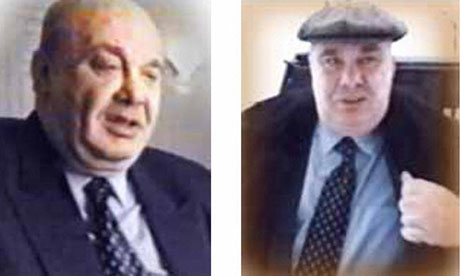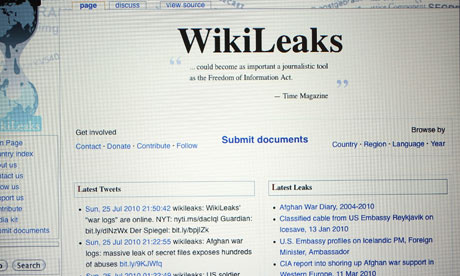
Evacuees are screened for radiation contamination at a testing center in Koriyama City, Fukushima Prefecture



















Russia can face a small conflict in West of the country but cannot answer simultaneously to two conflicts or one conflict in the East, an American cablegate regarding NATO’s answer to the Russian military exercises in 2009 that has been criticized even by Romania reads, news agency Mediafax reports.
In the note released by Wikileaks and quoted by Aftenposten in its online edition, NATO presented on November 18, 2009 a report on the Russian military exercises at Zapad and Ladoga. Exercises focused on countering a possible attack launched by Poland and Lithuania against Russia and Bielorus and included the used of ballistic missiles.
NATO’s report read that the military Russian exercises were aimed to remedy deficiencies identified in the 2008 conflict in Georgia. Russia’s military exercises, according to the report, proved that the country has a limited capacity to run operations in collaboration with air forces and continues to rely on old equipments and needs more military.
Canada and several other allied countries in Eastern and Central Europe including Romania criticized the “failure”of NATO to give a proper response to the Russian military exercises. Critics were included n a document signed by Poland, Czech Republic, Estonia, Latvia and Lithuania tht asked the organization of talks on Russia within NATO. Romania expressed its views that Russia’s exercises resemble with those it conducted in the Cold War period and are part of a worrying behavior.


France is facing possible legal action from the European Union over its policy of tearing down makeshift Gypsy settlements and hastily deporting their residents to Eastern Europe.
Since the beginning of the year, at least 8,000 Roma (as the Gypsy people are known) have been rounded up and sent to Romania and Bulgaria,according to France 24. Human rights groups, the Catholic Church and even members of President Nicolas Sarkozy's conservative Cabinet have condemned the policy, which many critics believe is designed to boost Sarkozy's popularity at a time of unpopular spending cuts.
Viviane Reding, the European commissioner for justice, fundamental rights and citizenship, today joined that growing wave of criticism. At a press conference in Brussels, she labeled the Roma expulsions "a disgrace" and said the policy was likely illegal under European law.
Semyon Mogilevich, one of FBI's most wanted people, identified as real power behind billionaire owner of Ukrainian-based RUE

We have received a legal complaint from lawyers acting for Dmitry Firtash about this article. Mr Firtash complains that the contents of the article are untrue.
Gas supplies to Ukraine and EU states are linked to the Russian mafia, according to the US ambassador in Kiev.His cable, released by WikiLeaks, followed statements by the then prime minister of Ukraine, Yulia Tymoshenko, to the BBC that she had "documented proof that some powerful criminal structures are behind the RosUkrEnergo (RUE) company".Allegations have long swirled that the Russian crime don Semyon Mogilevich had covert interests in Swiss-registered RUE, which distributes gas from central Asia.A billionaire Ukrainian businessman, Dmitry Firtash, nominally owns nearly half the company. (The Russian state firm Gazprom owns the other half.) In a confidential meeting with the ambassador, Firtash admitted Mogilevich was the real power behind his own multibillion-dollar gas interests. He insisted it was impossible to do business in Ukraine in the 1990s without striking sleazy deals with organised criminals.In a secret memo the ambassador, William Taylor, wrote: "He [Firtash] acknowledged ties to Russian organised crime figure Semyon Mogilevich, stating he had needed Mogilevich's approval to get into business in the first place." Taylor said the "softly spoken" Firtash had come to see him on 8 December 2008 and "spoke at length about his business and politics in a visible effort to improve his image with the USG [United States government]".His arguments were obviously "self-interested", Taylor said. "In a lengthy monologue Firtash described his evolution as a businessman from his beginnings as a food trader to the creation of RUE … He was adamant that he had not committed a single crime when building his business empire and argued that outsiders still failed to understand the period of lawlessness that reigned in Ukraine after the collapse of the Soviet Union."Taylor grilled the oligarch about his alleged ties to Russian organised crime. The Ukrainian press had widely reported that RUE's circle of true beneficiaries included Mogilevich. Firtash countered that it had been impossible to approach a government official for any reason "without also meeting an organised crime member".The cable stated: "Firtash acknowledged that he needed, and received, permission from Mogilevich when he established various businesses, but he denied any close relationship to him."Other cables said the two men were closely linked through "joint holdings in offshore vehicles" and "mutual personal relationships". They also share the same lawyer.[This update was inserted on 7 December 2010: Following publication of this cable, Dmitry Firtash issued a statement denying that Semyon Mogilevich had ever had any partnership or holding or other direct or indirect commercial associations or business interests with him. See footnote.]During his frank conversation with the ambassador, Firtash launched an attack on Tymoshenko. At the time she was locked in a power struggle with her former Orange Revolution ally Viktor Yushchenko, who was president. Firtash called himself Yushchenko's "close friend" and confidant, and his anger was understandable. A month before he met the ambassador, Tymoshenko had reached a provisional agreement with the Russian prime minister, Vladimir Putin, to abolish all intermediaries in the murky gas trade with Russia. The deal – still unimplemented – was specifically drawn up to get rid of RosUkrEnergo.The US says Mogilevich is one of the world's top mafia bosses, accusing him of creating eastern Europe's most powerful crime group in the 1990s. He is on the list of the FBI's 10 most wanted fugitives for his alleged part in a multimillion-dollar fraud involving a Pennsylvania-based company in the 90s.The Russians arrested Mogilevich in 2008 over tax evasion at a cosmetics chain. But in 2009 he was mysteriously released. Russia's interior ministry described the charges against him as "not of a particularly grave nature". The cable is deeply embarrassing for Ukraine's new pro-Russian president, Viktor Yanukovych. Firtash, the founder and chairman of Group DF, is one of the main oligarchs who financed Yanukovych's rise to power this year.Firtash's business interests across Europe include energy, chemicals and real estate, and he owns an influential Ukrainian TV station.In his cable Taylor noted that the gas trade had made Firtash staggeringly rich: "By 2006 Firtash's estimated worth was over $5bn, but most experts believed that Firtash had low-balled his true worth and estimated it was in the tens of billions. In his conversation with the ambassador Firtash gave no indication of the scope of his wealth."

The study also says the Swiss refused to allow refuge to thousands of Jews in spite of the fact they already knew of the existence of concentration camps. The nine members of the commission who come from Switzerland, Britain, the United States and Israel have spent five years on their research. They say Swiss authorities of having contributed to the expansion of the Nazi economy, by striking trade and financial agreements with Germany which helped to fund the Nazi regime.  Complicity They add that the provision of interest free credits to the Axis powers by the Swiss banks, and their willingness to trade gold for the valuable Swiss franc, allowed the Nazis to buy machinery and even war materiel from Switzerland. But the commission says its most disturbing finding was learning of the effect of the "excessively restrictive" Swiss policy towards refugees. According to the commissioners, and to Swiss sociologist, Professor Jean Ziegler, the Swiss authorities knowingly sent refugees to their deaths. "The Swiss Government and the army leadership knew exactly what would happen to the men women and children they turned down at the Swiss borders," he said. "The Bergier report says there were 110,000 Jewish people turned back. And I think that`s a complicity in genocide, that`s a complicity in genocide." The report has been contested by right-wing groups who claim the commission was biased and did not carry out sufficient research. |

• US diplomatic cables released by WikiLeaks are hosted by French firm
Postări mai noi Postări mai vechi Pagina de pornire

